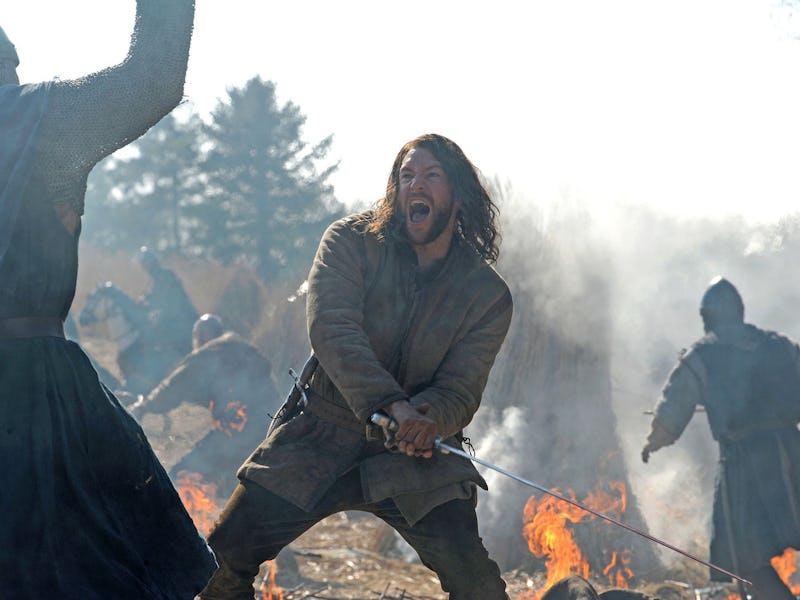FX's 'The Bastard Executioner' Is Trying the Long Con
The bloody new medieval drama is slow to launch. Can it regain its footing?

Anyone familiar with Kurt Sutter’s previous show, Sons of Anarchy, can’t be surprised his newest FX drama, The Bastard Executioner, has an uneven beginning liberally sprinkled with blood and guts. We break down the good, the bad, and the ridiculous of this new fall show.
The Bad: Dream sequences, please no. The Bastard Executioner opens with a dream sequence. Every creative writing teacher I’ve ever had says “Never begin your story with a dream sequence.” Now, every rule has its exceptions … except this one. It is not a particularly riveting opening when an angel visits our hero, Wiklin Brattle — played by newcomer Lee Jones — to give him a second chance when he is wounded in battle. The extreme violence feels unearned, since we literally just met him, and the dragon creature he hallucinates makes it difficult to make the argument that this show isn’t knocking off Game of Thrones.
In Sons of Anarchy, Sutter showed an affinity for the mystical in the form of the mysterious homeless woman who popped up like an omen whenever something dire was about to happen. It worked because for most of the show, she remained ambiguous. It was when Sutter decided to amp up her mysticism that he booted the trope, making what could have been a solid ending into a cheesy head-scratcher with out-of-the-blue biblical allusions and bad CGI.
Bastard Executioner is showing its cards that, from the get-go, it’s a more mystical show. From a creator who does not have the best track record with handling the ethereal, this is concerning. And indeed, with the dream sequence and Katey Sagal’s mystic witchy character Annora — who is played straight — the show is in dire risk of lapsing into unintentional farce.
The Good: The concept of a wronged warrior avenging his slain family is not exactly novel. We’ve seen it in Braveheart, Gladiator, and Sons of Anarchy. (Sidenote: I will stop mentioning Sons of Anarchy when Sutter’s new show stops echoing it. With Wilkin being a sort of Jax 2.0, only with less charm and bite, that might be a long time from now.) That said, the concept of a wronged man posing undercover as the local executioner and playing the long con in order to carry out his revenge is an intriguing, surprisingly modern idea for a medieval setting, and it’s ripe with possibility. The scene towards the end where Wilkin is silently trying to convince the old executioner’s wife to go along with his charade and play his fake wife was a tense, rivetingly bizarre moment in an episode that was an otherwise paint-by-numbers This Is A Medieval Show.
The Ridiculous: spending so long on Wilkin’s beautiful, virtuous pregnant wife and their perfect relationship that was obviously doomed.
Gladiator had a similar story arc, and even that two-plus-hour movie knew not to waste time showing his perfect family life that was very obviously about to be ripped apart. When you’re engaging with a narrative model the viewer has seen many times before, cut to the chase, guys. There’s no need to draw it out.
The early verdict: Bastard Executioner’s disjointed pilot contains promise, buried beneath Sutter’s more maddening impulses from Sons of Anarchy’s aimless later seasons. The great premise is the only thing to redeem the first episode. Otherwise it bogs down in unearned emotion and violence, lurching from character to character without rhyme or reason.
The medieval genre has been parodied so deftly by Monty Python and Mel Brooks that the parodies loom as large as the epics. If you want your viewers to take your medieval epic seriously, then, you have to grab them by the throat. Consider other medieval epics with serious tones: Game of Thrones might have confused you in its first episode, throwing characters and place names left and right, but in that final shot when Jaime Lannister shoved Bran Stark out the window, it didn’t matter whether you had become entrenched in the world yet — you certainly were now.
Highlander period drama Outlander, like Bastard Executioner, also took its time getting off the ground, but by the end of the pilot, when Claire Randall realizes she’s not in the 1940s anymore, you’re grabbed. Bastard Executioner did not have any such grabby moments, which rendered scenes like its dream sequence inadvertently comical. All hope is not lost — Starz period drama Black Sails had a ponderous first season that was far too joyless and self-serious for a show about pirates, but then it turned around and had one of the most riveting second seasons on TV. So Bastard Executioner may not be gripping, and it might be joyless, but perhaps it’s playing the long game with its viewers as well. Either that, or the long con will be that it is just another pretender to the medieval drama bandwagon.
Regardless, it can claim one dubious honor. After a single episode of a show that takes place in 13th century Wales, with greats like Danny Sapani in major roles, it’s already a more diverse show than Girls.